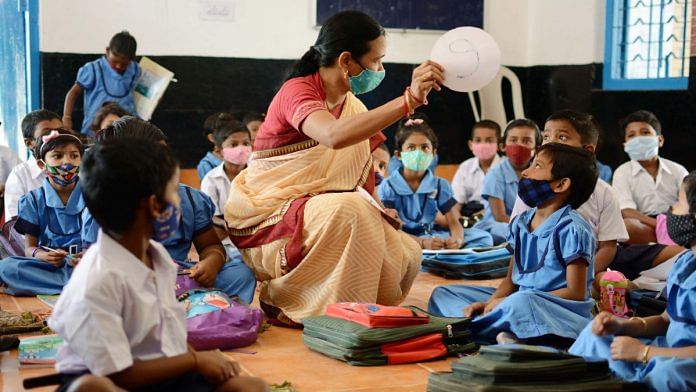New Delhi: Does your child own an app or have a patent? Has she or he won a national or international competition? If yes, then your child would qualify as “gifted”, according to the All India Council for Technical Education (AICTE).
The technical education regulator had announced last month that it would allow institutions to make provisions for two supernumerary seats under the “gifted child” category, for which it issued the criteria earlier this week.
“Institutions admitting students under this scheme are committed to give a complete tuition waiver to the admitted students. However, institutions may charge students fees for examination, hostel, library, transportation, laboratory, and other activities as per the prevailing norms,” the document issued by the AICTE reads.
According to the council’s definition, a “gifted child” is one who is “curious in studies and discusses answers in detail beyond the scope of the question”, “(makes) careless mistakes in repetitive tasks”, is a “keen observer in new learning activities”, “enjoys non-structured and non-routine problems”, and “speaks his/her own mind”.
The document also says that there is a difference between a “bright child” and a “gifted child” — a “bright child” being someone who is more sincere in the classroom and well-versed with the syllabus, “scores high on well-practiced tasks”, and is “compliant to the classroom”.
But for a child to qualify as “gifted”, he/she will have to be:
• A prizewinner of at least one national/international level competition organised by a government or a recognised private body;
• Has received funding from a government agency for pursuing innovative projects;
• Is a candidate having high-quality original research article publications in peer-reviewed journals as the first author;
• Is primary holder of a patent granted by Indian or international patent office;
• Is the owner of an app on Google/Apple/Windows stores or has launched or is in process of launching a technology based innovative product in the market (with more than 10,000 downloads).
Also Read: Pursuing two degrees simultaneously will benefit students. Polymaths not rare in India
Need to create awareness
The AICTE document further adds that recognising “gifted children” is not an easy task, and hence, there is a need to sensitise schools and teachers and nurture such children.
“Many gifted students remain unidentified as high achievers as they are laid back. They are not counted probably due to the poor score in school, but can be potentially high achievers. The purpose of the creation of two supernumerary seats for empowering gifted and talented students in AICTE-approved institutions is to enhance the innate potentials to the fullest of such students who have scored less or didn’t appear for the entrance test,” reads the policy document.
This is a view shared by education experts who, while lauding the AICTE’s initiative, told ThePrint that one must also address the need to create awareness about “gifted children” in India, adding that schools must develop a programme that caters specially to them.
“In India, we do not have a formal policy on who qualifies as a gifted child and what we can do to identify them. NEP has given some suggestions to sensitise people about it and now the AICTE document is a step ahead in that direction. This will serve as a beginning point, to make people aware of it,” said Dr Sameena Manasawala, Nurturing Domain in-charge at Pune’s Kaveri Gifted Education and Research Centre.
The AICTE, in its document, even countered the “general assumption or myth” that academically talented children will be successful no matter what educational environment they are placed in.
“The notion that creativity, high ability, and talents are extra endowments for a child and that she/he is already ‘the lucky one’ is prevalent in Indian society which expects such students to excel on their own with minimum additional support,” the document reads.
“The indigenous talents in rural areas remain mostly unidentified and on the other hand, students displaying intense curiosity, fertile imagination, and a questioning attitude do not find a creative outlet in a society, where examination scores are still a predominant indicator of ability. Therefore, gifted children need to be identified and nurtured,” it adds.
(Edited by Amrtansh Arora)
Also Read: Nehru’s policy is costing Indian school education. But Modi govt can fix it with vouchers



